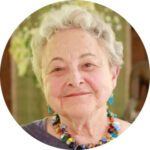Sylvia Boorstein on where safety is really found in a life with no guarantees.
My friend and teaching colleague Tamara phoned unexpectedly one afternoon with the news, “I’m just calling to say that you don’t need to worry about me.” Tamara had undergone surgery for suspected ovarian cancer just a few weeks previously and the original pathology report had been negative. A week later, with more experts reviewing the data, the diagnosis was changed to early-stage cancer and she had her first chemotherapy treatment.
When she called with the excited “no need to worry” message, I had the instant thought, “Praise be! They’ve reviewed the pathology again and she doesn’t have cancer.”
“I am safe,” Tamara continued, “even though Hurricane Frances is coming right toward Palm Beach. Some friends who have a house with fewer windows, one less isolated and exposed than mine, have invited me to sit out the storm with them. So, I’m leaving home and you won’t find me here if you call. Just know I am safe!”
I checked the progress of Hurricane Frances on the Weather Channel for the next three days and thought about how, because someone especially dear to me was in the middle of it, the storm had become more important to me. The meteorologists standing in the rain, clutching their windbreaker collars up around their necks with one hand and holding a microphone in the other, shouting over noisy winds to describe conditions and update evacuation instructions, became familiar to me. One young newscaster ducked suddenly out of camera range to avoid some flying roof tiles coming her way and then scrambled back up to finish her report. I admired her courage. I found myself wondering if her mother was watching her on TV.
After the storm, Tamara phoned and described her experience: “The storm wall came through in the middle of the night. It made tremendous noise. We sat on the sofa by candlelight, huddled together in our pajamas and robes. The windows rattled. We sat quietly, but whenever the house shook or the roar of the wind intensified, we prayed. We wished ourselves safe and protected from harm and we wished the same for everyone around us in our storm. Miraculously, I wasn’t frightened.”
I told Tamara about the moment in which I had imagined she did not have cancer. She said, “You know, I didn’t think about the cancer at all while the storm was going on. I didn’t forget that I had it. It just wasn’t what was happening. I can imagine this experience showing up in a dharma talk called, ‘Everything is Always Changing,’ or better yet, ‘Worrying is Futile: You Don’t Know What to Worry About First.’
“I thought about karma, how one degree of wind shift in either direction would be significant. And, you know what else? Even though we knew that we had no control over what happened, praying for ourselves and everyone else soothed us through the worst times.”
I find that I retell Tamara’s story most often as an example of the natural kindness that arises in people, even in stressed times—perhaps especially in stressed times—as a reflection of clear attention. In the midst of jeopardy the mind becomes energized and focused. Torpor and confusion disappear. It becomes impossible to miss realizing how precarious life is, how dear our connections are, how gratifying it is to connect with compassion. We care for and about each other. Tamara phoned to reassure me (and I am sure other friends and relatives as well), urging me not to worry. Her local friends reached out to offer her their home and hospitality through the storm. She and her friends, acknowledging both their fears and their deep desire to survive, found comfort in including the thousands of people around them in their prayers. I was reassured, three thousand miles away, by watching the Weather Channel and seeing the efforts the newscasters were making to keep everyone current about precautions they needed to follow. When I thought of the young meteorologist’s mother, I hoped she was not frightened and I imagined she was proud. I was relieved when the hurricane was downgraded to a storm.
The line of the story that still echoes in my mind is this: “Don’t worry about me…I am safe.” On the level of physical life, there is no guarantee of safety. Physical life is fragile. Hurricanes often claim lives. Accidents and illnesses of all kinds, ending lives or disabling them, happen all the time. And all lives, even long lives, end. “I’ll see you again soon” is always a hope more than a certainty. And yet, even when presented most directly with physical peril, we can say, “I am safe.”
I feel safe when my mind and heart reveal their natural kindness, when my concern for other people erases my “I” story on behalf of a “we” story. Tamara and her friends, huddled in a dark living room, felt accompanied by the family of anonymous Floridians whom they adopted into their circle of concern because they were sharing the same storm. Their concern soothed them through the most fearful times.
After the hurricane, I thought about all the other storms happening in the world. I thought about storms made by weather, and the extra storms of war and strife brought on by greed, hatred and delusion. I wondered what it will require for the world to realize that we are all sharing a monumental, ongoing storm of suffering and that, although we cannot change the course of hurricanes with our thoughts, by reaching out in comfort and support and consolation, we could change the world.

